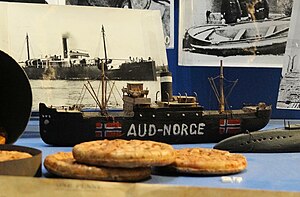SS Libau
|
Model of the vessel displayed at the Cork Public Museum
|
|
| History | |
|---|---|
|
|
|
| Name: | SS Castro |
| Laid down: | 1907 |
| Fate: | Captured by Imperial German Navy 1914 |
|
|
|
| Name: | Libau (Aud) |
| Acquired: | 1914 |
| Fate: | Scuttled 1916 |
| Wreck site: | Off Daunt Rock, Cork 51°43′N 8°14′W / 51.71°N 8.24°W |
| General characteristics | |
| Type: | Merchant vessel |
| Tonnage: | 1,228 GRT |
| Length: | 220 ft (67 m) |
| Beam: | 32 ft (9.8 m) |
| Draught: | 12 ft (3.7 m) |
| Speed: | 10 knots (19 km/h; 12 mph) |
Libau (pronounced [lɪˈbaʊ]; also known as SS Castro) was a merchant steam ship. In 1916 it masqueraded under the cover name of Aud ([ʔaʊ̯d]) in an attempt to carry arms to Ireland as part of the preparation for the Easter Rising.
SS Castro was a 1,062 ton steam cargo transport built for the Wilson Line of Hull, England in 1907. Castro measured 220 feet (67 m) in length with a beam 32 feet (9.8 m) and a draught of 12 ft (3.7 m). The ship was captured by the Imperial German Navy in the Kiel Canal, at the beginning of World War I in August 1914. Renamed Libau (the German name of Liepāja), she remained inactive until 1916, when designated as the vessel to carry a cargo of arms to Ireland, to aid the Easter Rising, and given the name Aud.
Masquerading as SS Aud —an existing Norwegian vessel of similar appearance— Libau set sail from the Baltic port of Lübeck on 9 April 1916, under the Command of Karl Spindler, bound for the south-west coast of Ireland. Under Spindler was a crew of 22 men, all of whom were volunteers. Libau/Aud, laden with an estimated 20,000 rifles, 1,000,000 rounds of ammunition, 10 machine guns, and explosives (under a camouflage of a timber cargo), evaded patrols of both the British 10th Cruiser Squadron and local Auxiliary patrols.
After surviving violent storms off Rockall, Libau arrived in Tralee Bay on 20 April. There they were due to meet with Roger Casement and others, with Casement having been landed nearby by the German submarine U-19. Due to a combination of factors (primarily as the ship carried no radio and was unaware that the date for its arrival off Fenit had been altered from Thursday, 20 April to Sunday, 23 April) the transfer of arms did not take place. Libau, attempting to escape the area, was trapped by a blockade of British ships. Captain Spindler allowed himself to be escorted towards Cork Harbour, in the company of the Acacia-class sloop HMS Bluebell. The German crew then scuttled the ship.
...
Wikipedia

